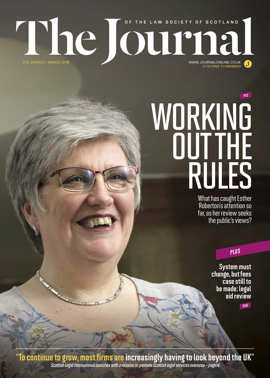President's column

Prince Philip once asked me “And what do you do?” Had I admitted to being a lawyer or solicitor, the inevitable next question would have been “What sort of law do you practise?”
As I’ve said often, I’m very happy with the career choice I made all those years ago. It’s worked out totally different to what I imagined when I went to Aberdeen University to study law.
I’m an Aberdeenshire loon and these days I’m proud of my North East heritage and the uniqueness of Doric. It was not always so. As a young undergraduate, even in Aberdeen I well remember fun being made of my fairly broad Doric accent. Some words are close to English, some not. (Forgive the following attempts at phonetic spelling – Doric is difficult to write or “scrive”.)
In Doric, “lawyer” is pronounced “liyar” – hence you’ll understand my reluctance to be called a lawyer. But someone who tells lies is a “lee-ar”. Doric folk have no difficulty understanding the difference between a liyar and a leear. Mind you, I’ve had the odd client who expected his liyar to lee...
When abroad and asked what I did for a living, no one knew what a solicitor was, so lawyer, advocate (sorry, Faculty) or even barrister have been used to try to explain (trouble is, with a Doric accent, “barrister” sounds like you’re offering to make a coffee).
As a mixed-up dialect kid, therefore, when asked “What are you going to be?”, I struggled with the idea that I was going to be a liyar, so “solicitor” was much easier to reply. Law by the way is “lah”, as in note to follow soh.
How easy for me, then, that the term “solicitor” is protected and regulated by the 1980 Solicitors (Scotland) Act. Yet recent surveys show that the vast majority of the public, and I suspect maybe our profession, think the two words are the same and all lawyers are solicitors and vice versa, and that all lawyers offer the same regulated professional standards as solicitors. The word “lawyer” is routinely used in place of “solicitor”; indeed it can be seen in many firms’ windows and web pages – legal aid lawyers, family lawyers, corporate lawyers… you get the drift.
There are legal services being offered by lawyers who are not regulated and therefore can’t call themselves solicitors – although some of these businesses do employ solicitors who are regulated. Confused? I’m sure they are in the main providing a good service, but do the clients of unregulated lawyers realise there is no client protection fund, no Master Policy, no SLCC? Our survey says NOT. Most assume, understandably, that all lawyers are regulated. Do the public then need further protection – and is that protection by regulating use of the word “lawyer”?
But then what about those who might want to call themselves lawyers who have no wish to practise as solicitors? Around half of law graduates probably fall into that definition, and of course there are legal academics and others.
Then we have the press who just love a good story about a misbehaving or failed solicitor, and if they are no longer a solicitor then the word “lawyer” does just as well. As I write this, we have a headline about a lawyer – who was formerly a solicitor – having the largest ever Scottish debt. Nothing to do with our regulated profession, but the public won’t get the distinction. I remember some years ago the story of a struck-off solicitor continuing to offer legal services and the problems that arose from that when his negligence became apparent – there were no consumer protections available for clients.
What is key in any debate on the term “solicitors” or “lawyers” is protecting the client. That’s why one of our recommendations to the current legal services review is to protect the term “lawyer”, with only those who are regulated and with proper protections in place able to call themselves a lawyer – or “liyar” if you’re from my neck of the woods.
In this issue
- Borrowings, partner capital and profitability
- GDPR and the cloud
- Employment claims: is the flood still to come?
- Contributory fault: drivers, cyclists and pedestrians
- Reading for pleasure
- Opinion: Derek McCabe
- Book reviews
- Profile: Siobhan Kahmann
- President's column
- Application changes coming
- People on the move
- Seeking a better way
- Beyond borders
- Drawings and profitability
- Enforceable rights or progressive policy goals?
- Conflict theory: it works
- What the liquidators don't tell you
- The office on the move
- Please can we have some more?
- Health check for doctors' lines
- When creditors come first
- Keeping goods exclusive
- Tenant Farming Commissioner: the story so far
- HSE appeals: experts allowed in
- Scottish Solicitors' Discipline Tribunal
- Please don't stop the music
- Broadcasting's business end
- Public policy highlights
- Scam warnings escalate
- This time it's personal
- The game's not a bogey!
- "Only amateurs attack machines; professionals target people"
- When estate agents need client ID
- Banks, client accounts and the Money Laundering Regulations
- Third party rights: what now?
- Ask Ash






